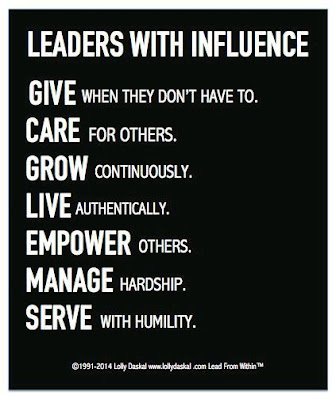HOW TO BE AN INFLUENTIAL LEADER?
By: Mahendra S Rathore. MBA BA (Honors) CFP® ChFC® CRPC® PMP® CLU® CHE®
Over the past year, the Covid led pandemic and, leading through the unpredictable crisis, has called in for crisis leadership in every sphere of the business and industry. These tough times have spotlighted a successful leader who has led the organization with remarkable creativity, skills, agility, and maverick leadership styles. The most critical contribution psychology has made to business has been in determining the vital traits of transformational leaders.
 |
| India's greatest Leader- Ashoka |
 |
| Father of Nation- MK Gandhi |
The essential qualities of an effective leader include the following:
- Emotional
stability(EQ): Good leaders must be able to tolerate frustration and
stress. Overall, they must be well-adjusted and have the psychological
maturity to deal with anything they are required to face.
- Dominance:
Leaders are often competitive, decisive, and usually enjoy overcoming
obstacles. Overall, they are assertive in their thinking style as well as
their attitude in dealing with others.
- Enthusiasm:
Leaders are usually seen as active, expressive, and energetic. They are
often very optimistic and open to change. Overall, they are generally
quick and alert and tend to be uninhibited.
- Conscientiousness:
Heart-centered Leaders are dominated by a sense of duty and tend to be
very exacting in character. They usually have a very high standard of
excellence and an inward desire to do their best. Being disciplined and
organized, they also need order and tend to be very self-disciplined and
meticulous.
- Social
boldness: Leaders tend to be spontaneous risk-takers. They are usually
socially inclusive yet aggressive and generally impervious to external
pressures. Such leaders are duty-bound, and they are responsive to others
and demonstrate humaneness and high emotional stamina.
- Self-assurance:
Poised and self-assured leaders are highly self-confident, and showing
compassion, kindness, and resiliency are common traits among such leaders.
They embrace an abundance mindset and tend to be free of guilt and have
little or no need for self-approbation or other's approval. They are
generally unaffected by prior mistakes or failures but learn from the
past.
- Relentless Passion:
Leaders are self-destroyed, controlled, and very precise in their social
interactions & engagements. Overall, they are very protective of their
morals, integrity, and reputation and consequently tended to be socially
aware and cautious, abundant in foresight, and thoughtful when making
decisions or deciding specific actions with consequences.
- Insight & Foresight:
Because of the rapidly changing world today, blended with information
overload results in an inability to prognostic accuracy in predicting
everything. To say it differently, human reasoning and logic will not get
you through all situations. More and more leaders learn the value of using
their intuition, experiences and trusting their inner intuition and gut
when making decisions.
- Empathy:
These leaders can feel the pain of others. Being able to put yourself in
the other person's shoes is a crucial trait of leaders today. Without
empathy and compassion, you cannot build trust; without trust, you will
never win hearts and get the best results from your teams.
- Charisma: People usually perceive leaders as larger than life. Appeal plays a large part in this perception. Leaders who have charm can arouse strong emotions in their teams by instilling a deep sense of purpose and a vision that unites and captivates them around the common goals. Using the power of vision, values, and purpose, leaders secure support and motivate teams to strive for true NorthStar and future plans. They accomplish goals by tying the goal to a bigger purpose and dish out substantial personal rewards and values.
- There is a general sense that Leaders are born and not made. Leadership is a science, and few believe that it is an art, and it can be developed by practice. However, there is no empirical research validation that leaders are born with the gift.
 |
However, Leadership does not imply being subservient to
avoid conflict or disagreements. Leaders can be polite yet firm, courteous but
confident, adaptable but not subservient. For all-around leadership skills, one
needs to integrate heartfulness with mindfulness to self-actualize one's full
potential.







Comments
Post a Comment